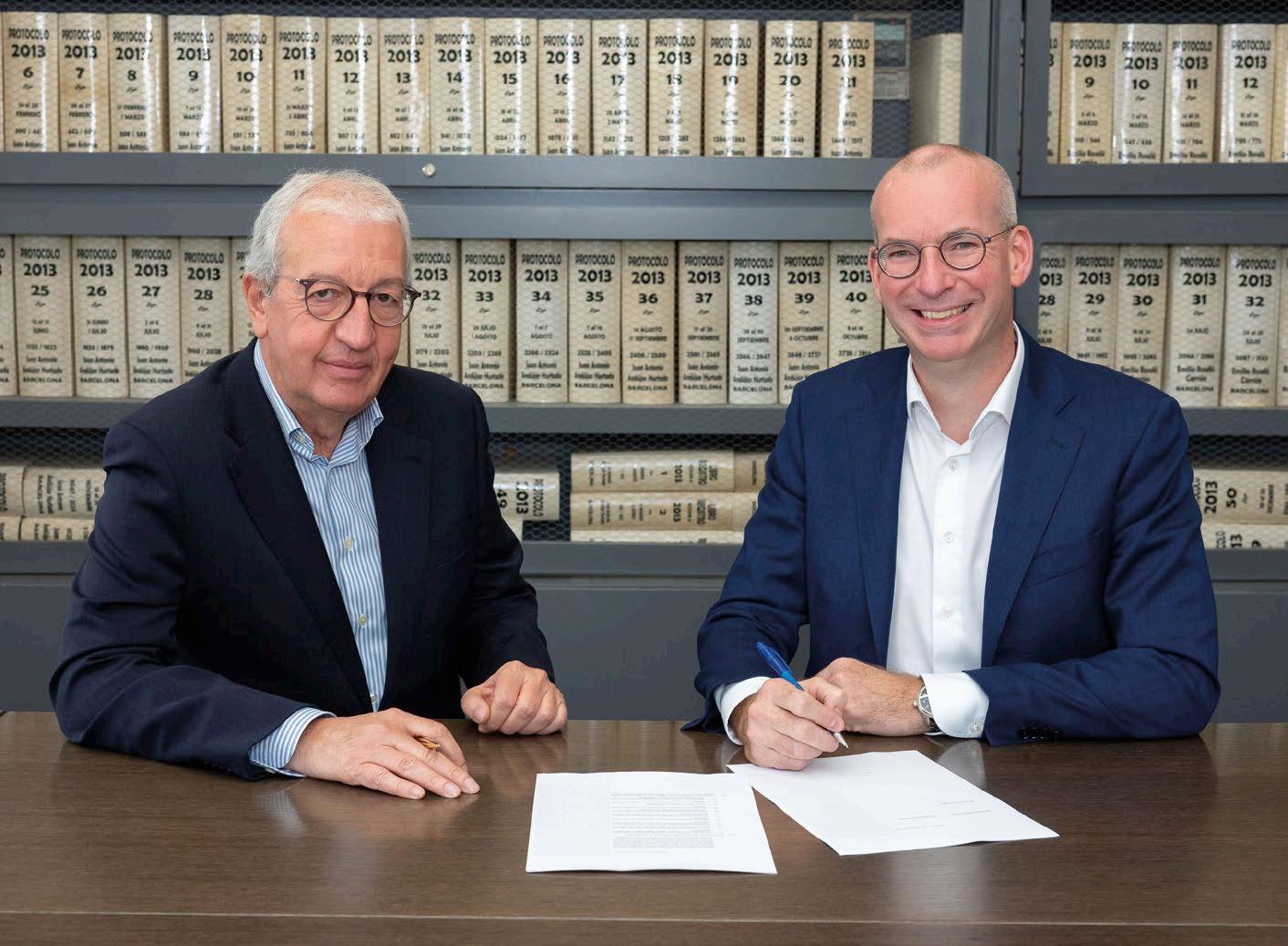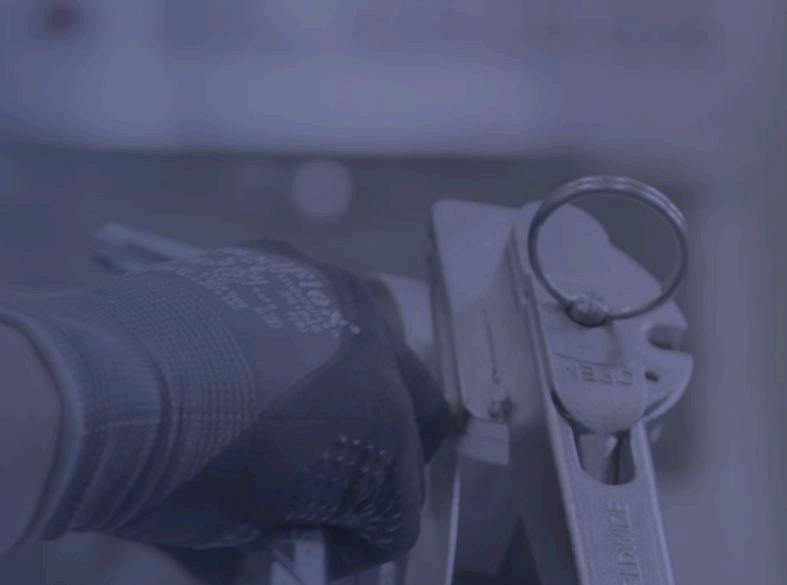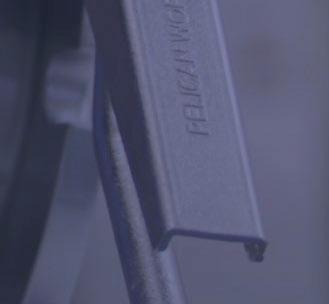
6 minute read
Van den Bosch buys TCS Trans
from HCB November 2021
A FAMILY AFFAIR
ACQUISITION • VAN DEN BOSCH HAS STRENGTHENED ITS POSITION IN SOUTHERN EUROPE THROUGH THE PURCHASE OF TCS TRANS AND ITS INTERMODAL FLEET
VAN DEN BOSCH has acquired TCS Trans, a Barcelona-based specialist in intermodal transport for the local petrochemical industry with a focus on dry bulk products, as well as liquids and gases. “Spain is a growth market with a lot of potential,” says Rico Daandels (pictured, right), CEO of Van den Bosch. “With this acquisition, we are taking the next step in developing our intermodal network in southern Europe.”
Family-owned TCS Trans, founded in 1958, mainly serves the Spanish and Italian markets, and invests in the development of the intermodal network. The company owns 50 per cent of Multirail, a leading private rail operator in Spain, and also has a share in the intermodal transport company Combiberia, the Iberian market leader in rail transport.
Van den Bosch says it is acquiring all the shares in TCS Trans but that the company will continue under its existing name from its current office and all employees will be retained. CEO Juan Castellet San Miguel (pictured, left) will continue as general manager, alongside his brother Eduardo who will maintain his operational and commercial responsibilities.
Following the acquisition, Van den Bosch, headquartered in Erp, the Netherlands, now has 11 locations in Europe, Africa and the Middle East. In September it boosted its presence in Africa with the addition of 500 new tank containers to operate in Côte d’Ivoire, where it plans to have a new tank cleaning station in operation in the second quarter of 2022. It is particularly targeting cargoes currently shipped in small packagings or flexitanks.
FITTING IN The TCS Trans fleet includes more than 300 containers and 100 trailers and chassis, which are part of the transaction. More than two-third of the fleet comprises pressurised silo containers for the transport of those chemical raw materials that have to be unloaded under pressure. Van den Bosch is already a market leader in this niche and the acquisition will strengthen its position in southern Europe, the company says.
“As a logistics service provider, we have gained a strong position in European logistics. With the acquisition of TCS, we are taking the next step in developing our intermodal network,” says Daandels. “We have been investing significantly in the Spanish market in recent years, as the demand for intermodal bulk transport is increasing and offers a lot of potential. Thanks to the acquisition, we will now also have a physical presence and will be pooling our strengths. From Barcelona, we will now be offering solutions for both dry and liquid bulk for the food and chemical industry.”
For his part, Juan Castellet San Miguel is pleased with the deal: “It means that our customers will benefit from Van den Bosch’s network, capacity and knowledge. In recent years, Van den Bosch has built up a strong intermodal network on the European market and, in addition to solutions for dry bulk, also offers liquid bulk transport on a large scale. By pooling our strengths, we can now offer our customers a complete bulk transport solution. Our customers will also benefit from the latest possibilities in the field of automation, technology and data exchange in the supply chain.” www.vandenbosch.com www.tcstrans.com
TCS TRANS IS A REGIONAL LEADER IN THE TRANSPORT




Part of your performance.




SAFE TO SHIP
THE USE OF freight containers revolutionised international transport, allowing all manner of goods to travel seamlessly by all modes virtually anywhere in the world. Yet, despite more than half a century of experience in using containers, accidents still happen regularly, not least during maritime transport. Those accidents refl ect bad practices, mostly on the part of shippers or consolidators: overweight containers, poor securement of cargo within the box or, in the case of dangerous goods, undeclared or misdeclared cargo. There are many reasons for this situation but much of it is to do with a lack of knowledge on the part of those packing containers. In particular, it is thought, container stuffers are often unaware of the forces to which containers will be subjected during transport by sea, which are very different to those experienced during rail or road transport. The result of these failings is often damage to the cargo, with a fi nancial loss to the shipper and disappointment to the consignee, or in worse cases damage to third-party property, personal injuries and environmental damage. CREATING THE CODE There are tools available to improve matters. A lot of work has been done over the years to try and drive better standards in the containerised chain, culminating in the publication of the Code of Practice for Packing of Cargo Transport Units (the CTU Code) by the International Maritime Organisation (IMO), International Labour Organisation (ILO) and the UN Economic
At Pelican Worldwide, we do not sit and wait for things to happen. Commission for Europe (ECE). Application of the CTU Code appears patchy CONTAINERS • THE SAFETY OF CONTAINERISED CARGO IN Over the years, we have worked hard to find ourselves in situations thus far; while its use is mandatory in certain MARITIME TRANSPORT REMAINS A CONCERN, DESPITE EFFORTS and places that yield our customers’ best results. With our global network of factories and warehouses, we are where the action is. jurisdictions and for certain goods, and is welcomed by carriers, insurers and regulatory FROM ALL SIDES TO IMPROVE STANDARDS Besides our state-of-the-art manufacturing sites in Wuxi (China) and bodies, it would appear that in many parts of Houston (USA), we have sales offices and warehouses in St. Petersburg the world it is being ignored or, perhaps more likely, is simply unknown. (Russia), Dubai (UAE), Istanbul (Turkey), Rotterdam (The Netherlands), Industry associations are keen to see the and Singapore. practices explained in the CTU Code get used more widely and have begun efforts to Being the world’s premier manufacturer of tank trailer and tank promote it in different fora around the world. container parts, we set the standard for manufacturing and distributing valves, gaskets, and ancillary products for the liquid and dry bulk At the Intermodal Europe event in Amsterdam in November 2017, for instance, four bodies gave a joint presentation on the Code and the transport industry. responsibilities it places on the various parties in the transport chain. The Global Shippers Forum (GSF), ICHCA International, TT Club and the World Shipping Council (WSC) have for some months now been working together to improve safety through a focus on cargo integrity. The specifi c aim has been to promote wider use of the CTU Code for correct packing and securing of all containers. Improved standards of declaration and handling of ROTTERDAM I HOUSTON I SINGAPORE I WUXI I ISTANBUL I ST. PETERSBURG I DUBAI dangerous goods are also within the scope PICTURE CAPTION: SECOND QUARTER TO BE of the Code, together with steps to prevent SOMEWHAT STRONGER THAN THE FIRST QUARTER.”pelicanworldwide.com pest contamination, and the provision










